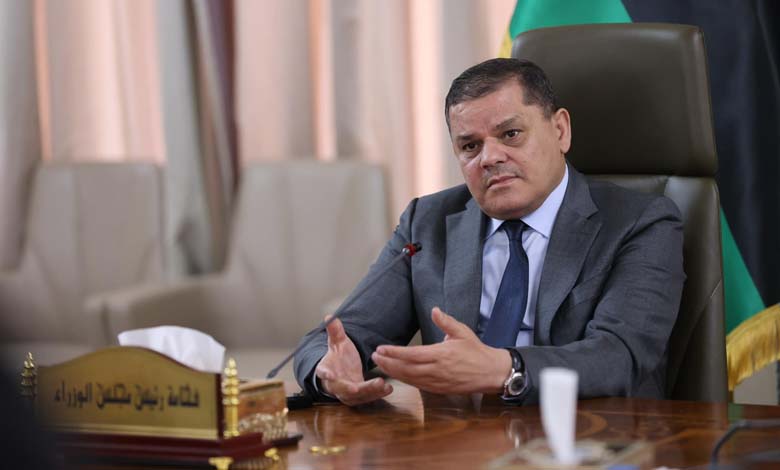How Dbeibah Planned to Eliminate His Former Ally “Gheniwa” – A BBC-Affiliated Report Reveals

A report published by Focus on Africa, a platform affiliated with the BBC, accuses Libya’s Prime Minister Abdelhamid Dbeibah of orchestrating the assassination of his former ally Abdelghani Al-Kikli — better known as “Gheniwa” — in a power struggle that highlights the worsening political crisis in Libya. The report warns of the increasing influence of armed militias and the central government’s failure to restore order.
-
Washington Backs Al-Kabir in Dispute with Dbeibah, Warns Against His Replacement
-
Financial Strangulation and Stalled Dialogue with Haftar Threaten Dbeibah’s Government Continuity
According to the report, Dbeibah carefully coordinated with armed groups from Misrata, Zawiya, and Zintan to carry out the assassination. Gheniwa was reportedly lured to Al-Takbali military camp under the pretext of negotiations, only to be executed in what has been described as a “field execution,” according to North Africa News.
Gheniwa was a powerful security figure and the head of the Stability Support Apparatus. His elimination is interpreted as an attempt to weaken rival power centers and shift the balance of influence in Tripoli.
-
Failure of Inter-Libyan Dialog Meeting Sparks War of Words between Dbeibah and Bachaga
-
Dbeibah after the Blinken meeting : Libya mercenaries must leave
The killing of such a prominent security figure exposed the fragility of the security situation in Tripoli and the central government’s limited control over the city’s militias and armed groups.
The incident also highlighted the immense power that these armed factions wield in the capital, often superseding state authority and obstructing efforts to build unified and effective national security institutions.
-
Head of Egyptian Intelligence in Tripoli and supplies for al-Dbeibah visit
-
Libyan Expert: Dbeibeh’s Move Is Too Late… Militias Have Become Partners in Power
The report attributes the growing conflict between Dbeibah and Gheniwa to the latter’s expanding influence over key sectors, including the security of government institutions, the national electricity company, and the Stability Support Apparatus, which received significant funding. This accumulation of power is said to have alarmed Dbeibah, who feared a shift in the power dynamic.
Following Gheniwa’s death, Tripoli witnessed violent clashes that led to the suspension of flights at Mitiga International Airport, forcing a rerouting of air traffic to Misrata. Power outages were reported in several areas, and the University of Tripoli announced a suspension of classes and exams.
-
Where is Western Libya Heading? Open Scenarios for the Future of the Conflict
-
Militia Arms Chaos Reignites Violence Spiral in Tripoli
Although a ceasefire was reached, the current calm in Tripoli is tenuous. The situation remains highly volatile, with multiple rival militias operating in the capital and overlapping interests constantly threatening the fragile stability.
Analysts warn that Dbeibah’s grip on power is unstable and short-lived, particularly given the absence of a clear successor to Gheniwa within the Stability Support Apparatus. Libya continues to face deep political divisions, with no definitive solution in sight.
-
The Brotherhood’s Mufti and Dbeibeh… An Alliance Driving Libya toward Catastrophic Scenarios
-
Libya’s Muslim Brotherhood Incites Armed Resistance Against Peaceful Solutions
Local and international efforts are underway to de-escalate tensions, promote dialogue, and restore calm. However, the path to long-term peace in the Libyan capital remains fraught with challenges.
Meanwhile, Dbeibah’s government has been hit by a wave of resignations, including his second deputy Ramadan Boujnah and the ministers of Economy, Housing, Local Governance, Finance, and Water Resources. Thousands have taken to the streets demanding Dbeibah’s resignation.
The prime minister faces accusations of failing to address major issues, including curbing militia dominance, tackling rampant arms proliferation, and restoring public security. International reports claim that many militia leaders involved in serious crimes, including killings, have evaded justice due to their close ties with influential political actors.
-
U.S. aid to Libya reaches one billion dollars
-
Armed Clashes in Tripoli Reveal Fragility of Security Situation
-
Clashes Between Militias in Tripoli Mar Eid Atmosphere
-
Demands for Formation of a New Government in Libya Pose Challenges for Dbeibeh
-
Complications Hindering the Evacuation of Militias from Tripoli












